
What is that “POP” you feel “down there”? Pelvic organ prolapse, or POP, can occur when the pelvic floor muscles, which stretch like a hammock to support our muscles, pelvic tissue and organs like the bladder, uterus, rectum and vagina, begin to sag due to damage or dysfunction sometimes to the point that these organs can drop down into the vaginal canal or anus. This can create a feeling of pressure or fullness in the vagina. Common types of vaginal prolapse include cystocele (dropping of the bladder into the vagina), rectocele (dropping of rectal tissue into the vagina), enterocele (dropping of the small intestine between the uterus and vagina), and uterine prolapse (dropping of the uterus into the vagina). If you are estrogen deficient, have recently given birth, frequently lift heavy objects, or have chronic coughing or constipation, prolapse could be affecting you. (https://invincible-pun.flywheelstaging.com/physical-therapy/Prolapse/page85.html)
Common signs of prolapse can include pain with intercourse, incontinence, vaginal spotting outside of your period and tenderness in the vagina. To check for prolapse, you can perform a quick self-exam. Empty your bladder. Take a mirror to exam the perineum or the area “down there.” Stand with one foot propped up so that you can more easily view the opening of the vagina. Now cough or bear down. Make sure you can visualize the vaginal opening and use the mirror to look for bulges in the front or back of the vagina.
Notice a bulge? What should you do? There are various options available for handling your POP from vaginal creams to surgery. Contrary to popular belief, these aren’t the only options that can help. Physical therapy and techniques recommended by pelvic floor therapists can rebuild and restore pelvic floor strength and function. Here are few things that you can do to get started:
1. Treat Yourself: To avoid prolapse or prevent agitation of an existing prolapse, making a conscious effort to avoid straining is key! This involves making lifestyle changes like monitoring your fiber intake and staying hydrated to prevent constipation or straining too hard while using the bathroom. You may not be able to avoid heavy lifting altogether, but when lifting is necessary, make sure you don’t hold your breath and use proper lifting techniques to prevent strain on the lower back and pelvic area. Devices like a pessary can be used to help support your pelvic floor with daily activity. Speak to one of our therapists for more details about self-treatment.
2. More Than Just Kegels: Therapists are often asked if there are exercises to treat POP besides Kegels and the answer is 100% yes! To understand why other exercises are effective, first consider how the pelvic floor works—it is multilayered to provide support for our pelvic organs, it assists with continence and it stabilizes our joints. So, it makes sense that the pelvic floor’s functionality affects many other aspects of our bodies. In turn, other areas of our bodies affect the pelvic floor. (For more on how we evaluate whether your pelvic floor is contributing to pain in other areas of the body, see https://invincible-pun.flywheelstaging.com/physical-therapy/Pelvic-Floor/). The therapists at Rebalance can examine you for pelvic floor and other muscle dysfunction. They can tailor an exercise program to help control your prolapse base on your individual needs.
3. Just Breathe: Exercise and movement are most effective when we are breathing with the diaphragm, not shallowly through the chest. The way we breathe sets the tone for all muscles to function. Diaphragmatic breathing is a great way to relax muscles and achieve better pain relief, but good breathing can make a big difference in our function too. (https://invincible-pun.flywheelstaging.com/physical-therapy/Featured-Exercise-Pelvic-Drop-to-Help-Release-Pelvic-Floor/subpage56.html) Be sure that you are using good technique. To practice this, lie on your back with both knees bent. Place one hand on your chest and the other placed on your stomach. Focus on inhaling into the belly, back and tailbone. Imagine your hips and SIT bones widening as you inhale. Feel your belly rise while your chest stays quiet. This may take some practice. If you are having trouble getting it down, ask one of the Rebalance therapists. They can help.
While these solutions may appear simple for a condition that feels frightening or overwhelming, you will be surprised by the difference these small changes can make! Don’t let pelvic floor prolapse continue to bring you down. Contact a Rebalance physical therapist today to learn about more options for treatment and how to “pop” your pelvic floor back into shape! Visit https://invincible-pun.flywheelstaging.com/physical-therapy/Prolapse/ for more information about POP and how physical therapy can help.
In-Person and Online Consultations


